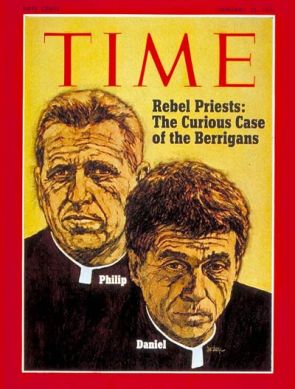Activists praise anti-war priest Daniel Berrigan jailed for fighting Vietnam draft who dies at 94

Tributes have flowed for Daniel J. Berrigan, a Jesuit priest whose defiance of the Vietnam War landed him in prison drawing both the praise and barbs of many Americans and who died April 30 at the age of 94 in the Bronx, New York.
The poet priest and activist died at Murray-Weigel Hall, the Jesuit infirmary at Fordham University.
His father Thomas was an Irish Catholic trade unionist and his mother Frieda was of German descent.
"The United States was tearing itself apart over civil rights and the war in Southeast Asia when Father Berrigan emerged in the 1960s as an intellectual star of the Roman Catholic "new left," articulating a view that racism and poverty, militarism and capitalist greed were interconnected pieces of the same big problem: an unjust society," Daniel Lewis, wrote in his New York Times obituary.
Berrigan and his younger brother, Philip Berrigan, emerged as leaders of the radical anti-war movement in the 1960s, reported The Associated Press.
Berrigan's was basically a religious position derived from a rigorous reading of the Scriptures "that some called pure and others radical" writes Lewis.
"But it would have explosive political consequences as Father Berrigan; his brother Philip, a Josephite priest; and their allies took their case to the streets with rising disregard for the law or their personal fortunes."
MAIRHEAD MAGUIRE
Northern Ireland peace activist, Mairead Maguire, a Nobel Peace Laureate and founder of Peace People wrote in America: The National Catholic Review that "Father Dan was a man of great courage, whose life touched millions, not only through his writings but especially by his actions.
"His message was delivered with great clarity and based on his passionate belief in the power of the Gospel of Nonviolence and Jesus's message of no killing and love of enemies."
Maguire said that as a young man, Berrigan knew the cost of war, when his four brothers left home to join the Second World War.
"They returned having witnessed much horror and suffering and it was out of this experience came the Berrigan Brothers conviction of what Father Dan called 'the sin of war' and their lifetime commitment to the abolition of war, nuclear weapons and all forms of violence."
In May 1968, the Berrigan brothers went into a draft board in Catonsville, Maryland, in May 1968 with seven other activists, removing records of young men about to be sent to Vietnam, taking them outside, placing them in garbage cans and burning them.
They were dubbed the Catonsville Nine, convicted on federal charges that accused them of destroying U.S. property and interfering with the Selective Service Act of 1967, The Associated Press reported in The Guardian .
They received prison sentences ranging from two to three and a half years.
The brothers made the Jan. 25, 1971 cover of Time magazine under the headline, "Rebel Priests: The Curious Case of the Berrigans."
In 2009 Berrigan was asked by America magazine if he had any regrets about his actions and he replied: "I could have done sooner the things I did, like Catonsville."
Father Berrigan was released from the Danbury penitentiary in 1972; the Jesuits, alarmed at his failing health, managed to get him out early. He then resumed his travels.
RELEASE FROM JAIL
Lewis writes in the Times that after his release from Danbury penitentiary in 1972 Father Berrigan accused Israel of "militarism" and the "domestic repressions" of Palestinians and his remarks angered many American Jews.
"Let us call this by its right name," wrote Rabbi Arthur Hertzberg, himself a contentious figure among religious scholars: "old-fashioned theological anti-Semitism."
However Philip Weiss wrote in Mondoweiss, "Sadly the Times did not quote from the speech in any fair measure."
He adds, "It's a pity that the New York Times doesn't explain that Berrigan's critique of Israel was equally harsh to his criticism of the United States at the time; and more important, that it was prophetic."
However Lewis writes in the Times that Berrigan was also not universally admired by Catholics.
"Many faulted him for not singling out repressive Communist states in his diatribes against the world order, and later for not lending his voice to the outcry over sexual abuse by priests."
Father Daniel's brother Philip, died in 2002, aged 79.
Berrigan continued his life of activism and was arrested a number of times in the 1980s and remained opposed to wars such as American intervention in Central America, the Gulf War in 1991, the Kosovo War, the U.S. foray into Afghanistan, and the 2003 invasion of Iraq.
